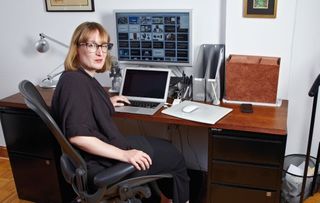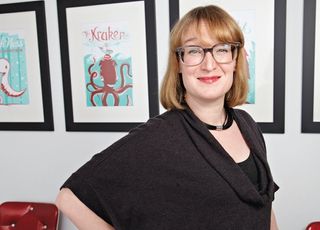Karen McGrane on content in a zombie apocalypse
Karen McGrane gives a sneak peek at her talk and explains why conferences are a rich source of learning.
Enter the code generate100 at the checkout this week to get $100 off your ticket to Generate New York, which is taking place next week on 20 June.
We've got some amazing speakers lined up for our first New York conference, Generate, and Karen McGrane is one of them.
Karen's talk will be about what Scott Jenson calls "a zombie apocalypse of electronics", that is, the proliferation of devices that's currently presenting a big challenge for content strategists.
We spoke to her about what she's working on at the moment, and why she thinks the problem of separating content from form will keep her fascinated forever.
Tell us what you've been working on recently.
Karen McGrane: I'm currently working with both Hearst and Marriott on adaptive content problems. Debra Robinson, the CTO of Hearst, and Meg Walsh, the head of Platforms and Systems at Marriott, both came up to me after they heard me give my Adapting Ourselves to Adaptive Content talk and said, "We are dealing with this exact problem right now and you should help us."
And, it's true, both organizations have the same challenge with adapting their processes, tools, and culture to supporting true multi-channel content - and yet their needs are completely different. I'm enjoying everything I'm working on right now because the problems are so interesting and so diverse.
You're doing some workshops with Ethan Marcotte - tell us about those.
I am beside myself with excitement about the Responsive Design Workshops Ethan and I are offering. We both saw a real pain point in the industry - organizations want to implement responsive design, but discover quickly that the problems they struggle with go well beyond fluid grids, flexible images, and media queries. Doing responsive design right touches every aspect of project planning and the design process.
Organizations need to re-evaluate project goals, team staffing, roles, and responsibilities, review and approval processes, and, yes, even their content strategy. Ethan and I are offering one-day and two-day workshops with organizations to give them a foundation that will help their responsive design project go more smoothly.

What are the big ideas you're thinking about at the moment?
I am endlessly fascinated by what it means to create content that can and will live on all different kinds of devices. Part of that still involves convincing people that we live in a world where the desktop isn't the center of the universe anymore. So I'm always looking for ways to advance the argument that whatever people want to do on the internet, they will want to do it on a mobile device. That said, I also look forward to a day when we don't need to make that case anymore, because everyone just acknowledges we live in a multi-device world.
That's when the real fun starts, I think. When you think about what it truly means to set content free from its container, you realize how different that is from how people have communicated in the past. The problem of separating content from form is hugely transformational - I think it's a Gutenberg-level transition - and if I do nothing else but poke at that problem for the rest of my career, I don't think I'll ever get bored.
What are you going to speak about at Generate New York?
My talk is called Content in a Zombie Apocalypse, and it's about that very topic, separating content from form. I talk about the potential future of new devices and interaction models, what Scott Jenson calls "a zombie apocalypse of electronics," and what it means that we have to get our content onto all of them. Then, I share some examples of how organizations can deliver the same content - or equivalent content - so that users can get the same information and complete the same tasks on whatever device they happen to be using.
What do you think makes a good conference?
I love it when people want to tell me about what's going on in their organization. I learn something whenever I hear someone else's story. So I love it when events help facilitate conversations between the attendees and the speakers, and I hope people would feel comfortable coming up to talk to me.

You speak at a lot of conferences - why do you do it so much?
I don't think there's a better way to learn and get exposed to new ideas. Watching people put on a performance on stage - when it's great, there's nothing better for education or entertainment. Personally, I also love the chance to explore my own ideas and share them with an audience. It's fun for me to figure out how best to explain something, get my slides designed, practice my delivery, and then get to perform it on stage. I get an immediate sense of whether my ideas and delivery resonate with the audience, which is gratifying.
Are there any speakers you're particularly looking forward to seeing at Generate?
Every single one of them you've announced so far! I saw Cap Watkins talk about his work at Etsy at another event last year and I thought it was a fascinating case study. I think everyone working on the web should hear Derek Featherstone talk about accessibility and how it makes a better web for everyone. I just adore Jenn Lukas and I am excited to hang out with her, as well as see her talk! Her energy just makes people feel good.
Enter the code generate100 at the checkout this week to get $100 off your ticket to Generate New York!

Thank you for reading 5 articles this month* Join now for unlimited access
Enjoy your first month for just £1 / $1 / €1
*Read 5 free articles per month without a subscription

Join now for unlimited access
Try first month for just £1 / $1 / €1
Get the Creative Bloq Newsletter
Daily design news, reviews, how-tos and more, as picked by the editors.

Tanya is a writer covering art, design, and visual effects. She has 16 years of experience as a magazine journalist and has written for numerous publications including ImagineFX, 3D World, 3D Artist, Computer Arts, net magazine, and Creative Bloq. For Creative Bloq, she mostly writes about digital art and VFX.